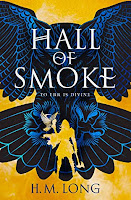5/5 stars on Goodreads
 |
| Inscape by Louise Carey |
Inscape is the debut (solo) novel of Louise Carey, and it’s a great one; interesting, immersive and mature. I received an early review copy from NetGalley in exchange for an honest review. The book comes out on January 21st.
The name of the book and the description gave me the notion that Inscape would be some sort of virtual reality scape into which special agents entered their minds at their own risk while their bodies were suspended elsewhere, like in Matrix. That’s not the case at all. The book is set in future London in a world that has suffered a catastrophic event called Meltdown, though what it was and when it was isn’t explained. It’s not really important anyway. The current world is. London is divided into two zones on both sides of the Thames, which is only a dried-up riverbed turned minefield. Each side is ruled by a major technical corporation that have hostile relationship with the other, InTech in the north and Thoughtfront in the south. Everything and everyone is in the service of these corporations.
Inscape is an AR system installed directly in people’s brains and everyone on InTech side is augmented with it; the other side has their own system. Not only does it enhance people’s abilities—or supress them in case of mindless slaves—it also spies the residents. But it’s all perfectly normal as far as Tanta, the main character, is concerned.
Tanta is a CorpWard, an orphan who has been raised by InTech to be of service for the corporation. She is happy to serve, lives to please her superiors and fears their upset. She has been trained as an agent whose job is to prevent the other corporation from operating on her side of the river. She is absolutely loyal to her handler Jen, and will do anything she tells her. Her very first assignment doesn’t go as planned though, which causes her great deal of distress. But she doesn’t need to worry; she’s being given another chance: find out what has been leaked from InTech and by whom. She’s assigned a partner, Cole, a fifty-something neuroscientist with no field experience whatsoever and who suffers from a grave memory loss thanks to an accident with a device that wipes off peoples’ memories.
The first half of the book is a bit slow. We follow Tanta in her new role as an agent investigating the leak. The investigation seems somewhat random and produces results that don’t seem to lead anywhere. But the focus is, for the reader, elsewhere. We learn, unlike Tanta, that she has been carefully conditioned to be a perfect tool for the corporation. She is physically incapable of disobeying orders or being disloyal. She doesn’t understand other peoples’ reactions to her when they fear or pity her. And she doesn’t understand how anyone could betray the corporation by deliberately leaking its secrets.
The pace picks up on the second half. Something happens to break Tanta’s conditioning, after which she has to question who she is and why she is doing what she is. It’s not easy for her, but the process is described well. Nonetheless, she’s determined to finish the assignment given to her. Only, the truth turns out to be even more mind-shattering, not just for her but for her partner Cole as well.
Tanta is a great character and the reader follows her path from a mindless tool to independent thinker with interest. Cole, with his memory loss and timidness, is interesting too, and the two form an unlikely friendship. The characters without their own point of view, like Tanta’s girlfriend Reet, aren’t quite as well-rounded, but they serve a role in Tanta’s change too. The world with its technological wonders is kept simple and no explanations are given to why it has turned the way it is. The reader plunges right in and is taken for a ride. The writing is competent and the pacing is good. And if events fold out a bit too neatly for Tanta and Cole, every plan and operation executed as intended without surprises, it has enough twists and turns that the reader can overlook it. Besides, I like books where nothing bad (relatively speaking) happens to the characters. The book ends with a teaser for the next book and I’m definitely interested in reading that one too.

















